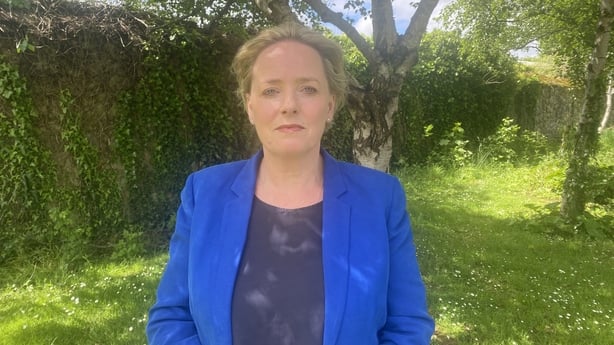Labour leader Ivana Bacik has expressed concern at the plan to cut payments to Ukrainian refugees, claiming such a policy could amount to targeting of older people and women with children.
She called for "clarity" that the new Goverment policy will be fair.
Ms Bacik also said the announcement of a review of payments to International Protection applicants appeared to coincide with the upcoming European and Local elections.
The founder of Effective Aid Ukraine also said the decision is unfair and lacking in compassion.
Speaking on RTÉ's Today with Claire Byrne, Tom McEnaney said the move will adversely affect elderly Ukrainians, women and children.
He said that 18,000 children are likely to be badly affected by this change.
Mr McEnaney dismissed the move as a measure aimed at garnering votes from an anti-migrant section of society.
It is completely unfair to ask people to live on €37 a week, he said, adding that "it is a hardship level of subsistence".
There has been zero engagement because there is zero attempt to do this fairly, Mr McEnaney said.
Unlike most other countries, Ireland does not provide military aid to Ukraine, he said.
'Not enough detail'
Director at Ukrainian Action in Ireland Anatoliy Prymakov said the proposed changes will have a negative impact on the "weakest and the most vulnerable in society."
He added; "nobody knows what is coming, there is a great deal of confusion the day after this announcement because there is not enough detail being explained to the people."
He said it was a great idea to have a universal approach to beneficiaries of temporary protection, but the problem was recipients around the country will find themselves in very different circumstances depending on where they are.
"Not all of them are able to work, not all of them are able to support themselves, there are big barriers for them in terms of access to employment, in terms of transport, and infrastructure, and in terms of accessing work."
He said those provided with accommodation in rural areas will really feel the impact of this change.
Speaking on RTÉ's News at One, he said 43% of Ukrainian people in Ireland are working, according to a survey they conducted. However, he said there are many barriers for those who are not working including learning English.
He said other less obvious barriers included people being moved from State accommodation in one part of the country to another far away.
"There is poor transport links, there is uncertainty overall about the immigration status in Ireland because nobody knows what will happen with the EU directive, you know granting people the temporary protection."
He said these matters make employers hesitant to hire people to begin with.
Meanwhile, the National Co-Ordinator of the Ukraine Civil Society Forum described the latest proposals to cut social welfare supports to Ukrainian refugees as "extraordinarily heartless."
Emma Lane-Spollen said this decision was being made as the war in Ukraine was "getting worse".
"The people who are here are largely woman and children (including) young children in very rural locations," Ms Lane-Spollen said.

"Even finding employment or accommodation is extremely hard, there is no access to HAP (the Housing Assistant Payment), there is no access to other supports, so now we are impoverishing people on €38.80" Ms Lane-Spollen said.
"I actually think that the motivation has got to be that they are trying to move people out of Ireland and to say "go!"
The payment of €38.80 per week is based on the allowance paid to people in International Protection Accommodation.
"We know that that is a payment that has not increased since 2019, it has not increased with the cost of living and there shed-loads of papers that will tell you that it is causing poverty, ill-health and malnourishment in children," Ms Lane-Spollen said.
"To suggest that we are going to put another 20,000 children to live in poverty, as well as disabled people, (people) who are sick and vulnerable, women who cannot work, I think is absolutely shocking," Ms Lane-Spollen said.
Ms Lane-Spollen said many details remain unknown and she called for the clarity on what is being proposed as soon as possible.
"Will people on back to education (allowances), will they loose their allowances and have to give up going to college?" Ms Lane-Spollen asked.
Additional reporting: Laura Fletcher

